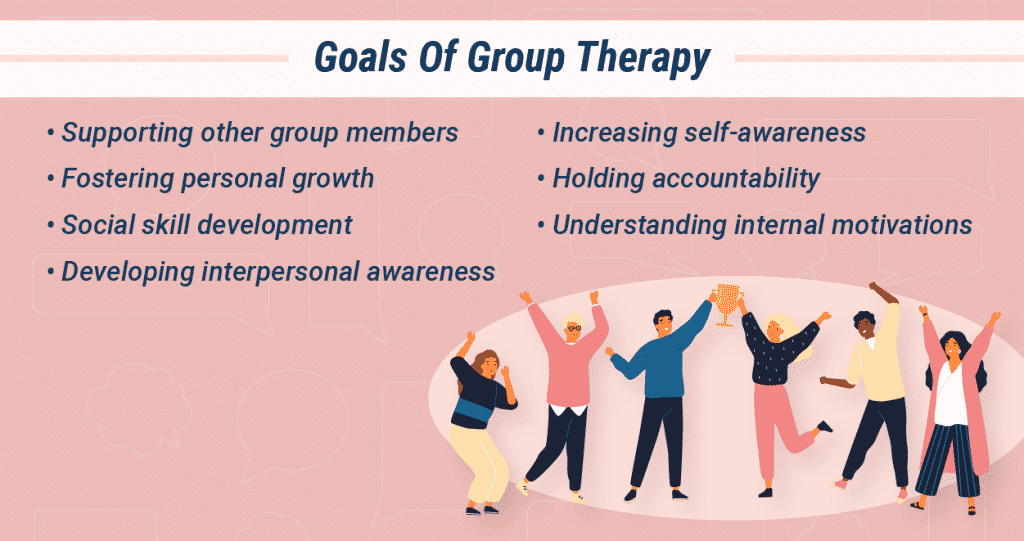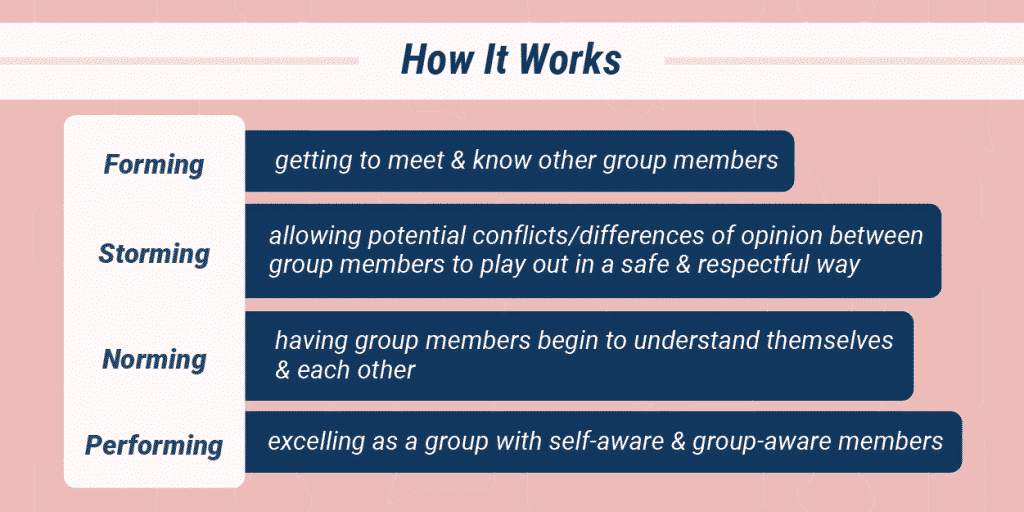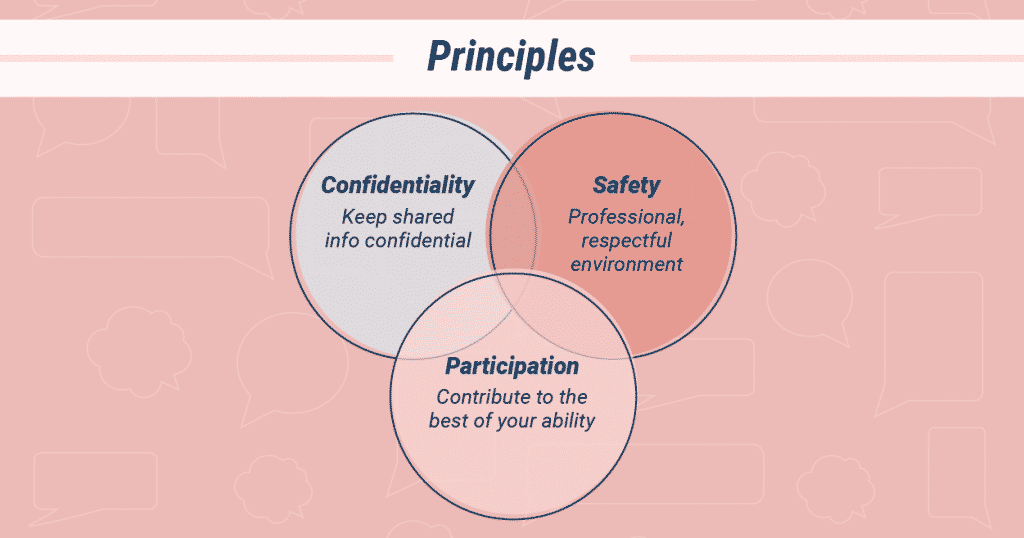Group therapy is an effective approach to treating addiction and mental health conditions.
Psychotherapy is a core component of treating addiction, mental health disorders and many types of chronic conditions. Among the various types of psychotherapy, group therapy offers unique benefits and challenges that may be well-suited to patients who are willing and able to use this approach. Group counseling can be an integral part of a person’s treatment path, and there is scientific evidence that group therapy programs are beneficial in treating addiction and mental health disorders.
What Is Group Therapy?
Group psychotherapy has been a staple of treatment of many conditions for decades. But what is group therapy?
A trusted group therapy definition comes from theAmerican Psychological Association(APA). It states that group therapy is a group of patients (who often share a common experience) led by one or more therapists for the purpose of development or learning. Goals of group therapy include:
- Supporting other group members
- Fostering personal growth
- Social skill development
- Developing interpersonal awareness
- Increasing self-awareness
- Holding accountability
- Understanding internal motivations

Therapy groups can be formed in a number of ways. For example, groups may focus on a particularmental health issue(e.g.,panic disorder,depression) or around a common experience (grief, loss of a partner). Therapists often recommend group therapy to patients who are already in individual therapy, as group therapy can offer particular benefits and perspective to these patients.
Treatment Can Be Life Changing. Reach out today.
Whether you are struggling with addiction, mental health or both, our expert team is here to guide you every step of the way. Don’t wait— reach out today to take the first step toward taking control of your life.
The size of groups can vary widely based on factors like organizational needs and therapist preference. The American Group Psychotherapy Association (AGPA) states that group therapy hasan optimal rangeof seven to ten members per therapist. Groups must be large enough to include an array of input from members but not so large that participation suffers.
How Group Therapy Works
Before beginning treatment, it is important to have an idea of how group therapy works. Group members often act in supportive roles or as sounding boards for one another, helping each other test out ideas or new behaviors in a safe setting. Members help hold each other accountable for what they say, do and promise.
Therapy groups follow thestages of group development, which apply to all teams of people who work closely together:
- Forming:getting to meet and know other group members.
- Storming:allowing potential conflicts and differences of opinion between group members to play out in a safe and respectful way.
- Norming:having group members begin to understand themselves and each other.
- Performing:excelling as a group with self-aware and group-aware members.

Principles of Group Therapy
Group therapy work usually involves sharing substantial personal information — some of which may feel embarrassing or seem unappealing. To help keep the environment safe, there are principles of group therapy which govern its use and ethics. The most important of those are:
- Confidentiality:The therapist and the group members all agree to keep shared information confidential. Patients must not disclose any identifying information of another group member. They cannot talk about another group member’s experiences unless the member gives them permission. However, patients are actively encouraged to discuss their own experience and reactions to information shared with them. Exceptions to confidentiality arise when a therapist is legally obligated to inform the authorities. This happens if a person is in immediate danger ofself-harmor presents an immediate threat to someone else.
- Safety:The therapist has a responsibility to set up a professional, respectful environment for the group’s members. It is the therapist’s duty to maintain an environment free of sexual misconduct, discrimination and harassment. Patients are often encouraged to talk to each other about their feelings rather than act them out. They are also encouraged to discuss if members interact with each other outside of the group.
- Participation:All patients are expected to contribute to the best of their ability. Therapists and other group members are often aware of when a member seems over- or under-involved. It may be part of that member’s therapeutic work to understand more about the participation dynamics.

What to Expect in Group Therapy
To help prevent anxiety in potential patients, it is important to know what to expect from group therapy in a typical session. Group therapy experiences can occur multiple times per day ininpatient settings. Inoutpatient settings, they are usually once per week. In both settings, group meetings last for one to two hours at a time.
In group therapy, patients are arranged so that they can see and talk to each other freely. In some groups, the therapist will begin with a topic for discussion. In others, the meeting may begin in silence and the discussion between group members happens organically as they talk about experiences, feelings or reactions.
In all groups, discussing your emotional reactions as they arise is of critical importance. These reactions provide significant insight into the way that someone processes information. Understanding how this information is being processed is the first step in being able to create new adaptive strategies in areas where unhealthy strategies have taken root.
Though most group therapy is driven by dialogue between members, some group therapy activities go beyond sitting and talking. Group therapy activities may include physical activity like hiking, walking, cooking, dancing or making art and music. When these types of group therapy activities are used, it is often as an icebreaker or a trust-building exercise.
Types of Group Therapy
Though styles of group therapy vary depending on the therapist, most can be categorized into one of two primary types of group therapy:
1. Psychoeducational
Psychoeducational group therapy teaches members about specific topics, conditions or skills. The therapist acts as an instructor and encourages participation from the members. Psychoeducational group therapy activities may include group projects, homework or presentations from group members about particular topics relevant to the group.
Psychoeducational therapy best serves those who are looking to build specific skills, such asrelapse prevention,stress managementorsober dating.
2. Process-oriented
In process-oriented group therapy, the experience of being in the group is of primary importance. How members relate to one another and their therapist provides important information and creates meaningful reactions. These actions tie into how a patient relates to the world at large.
A central feature of process-oriented group therapy is how a patient’s usual behavior patterns in the world tend to manifest in the group. Part of a group member’s therapy is to understand when and where these patterns are useful and when and where they are not.
Process-oriented therapy can be especially helpful for those who are experiencingproblematic behavior patternsor significant life transitions.

Benefits of Group Therapy
The benefits of group therapy tend to last far beyond an individual’s participation in the group. Most people do not get the opportunity to talk with other people openly and honestly about themselves like they can in group therapy. Many people find this opportunity to be healing and restorative.
Groups offer a wealth of input from diverse member experiences. The life experiences that you share can help others understand these situations in a new way, and the experiences of other group members can do the same for you.
Psychoeducational group therapies provide valuable, detailed information about topics and conditions that may have caused distress in a patient’s life. Process-oriented group therapies provide insight into an individual’s behavior and response patterns. These forms of therapy can allow unclosed wounds from the past to be revealed and to properly heal.
Group Therapy in Addiction and Mental Health Treatment
Group therapy focuses on discovering topics that have created distress in a patient’s life. Since it can provide valuable feedback about an individual’s behavior, this type of therapy is tailor-made for addiction andmental health treatment. For decades, group therapy for addiction treatment has been a staple of recovery efforts in both inpatient and outpatient settings.
In mental health settings, groups can help provide evidence-based strategies for managing specific problems. They can also help provide insight into a more generalized pattern. Whether you are treating addiction, a mental health condition or another disorder, unlocking the power of group therapy can be an immensely rewarding experience.
The Recovery Village has many types of therapy available. Group therapy is an integral part of treatment and we can help you understand how it can benefit your recovery from an addiction, a co-occurring mental health condition or other disorder.Contact ustoday to find atreatment therapythat will work well for you.








